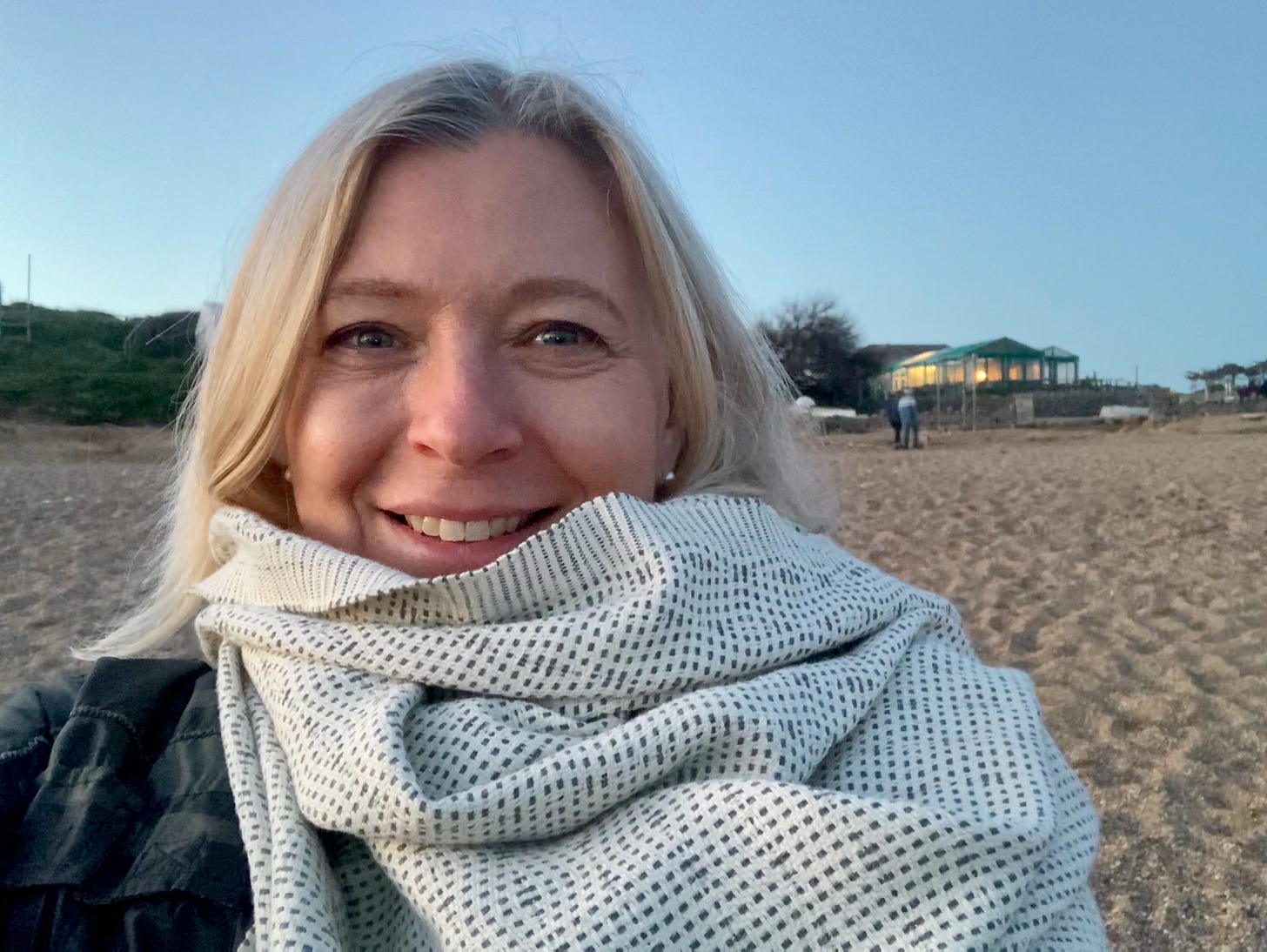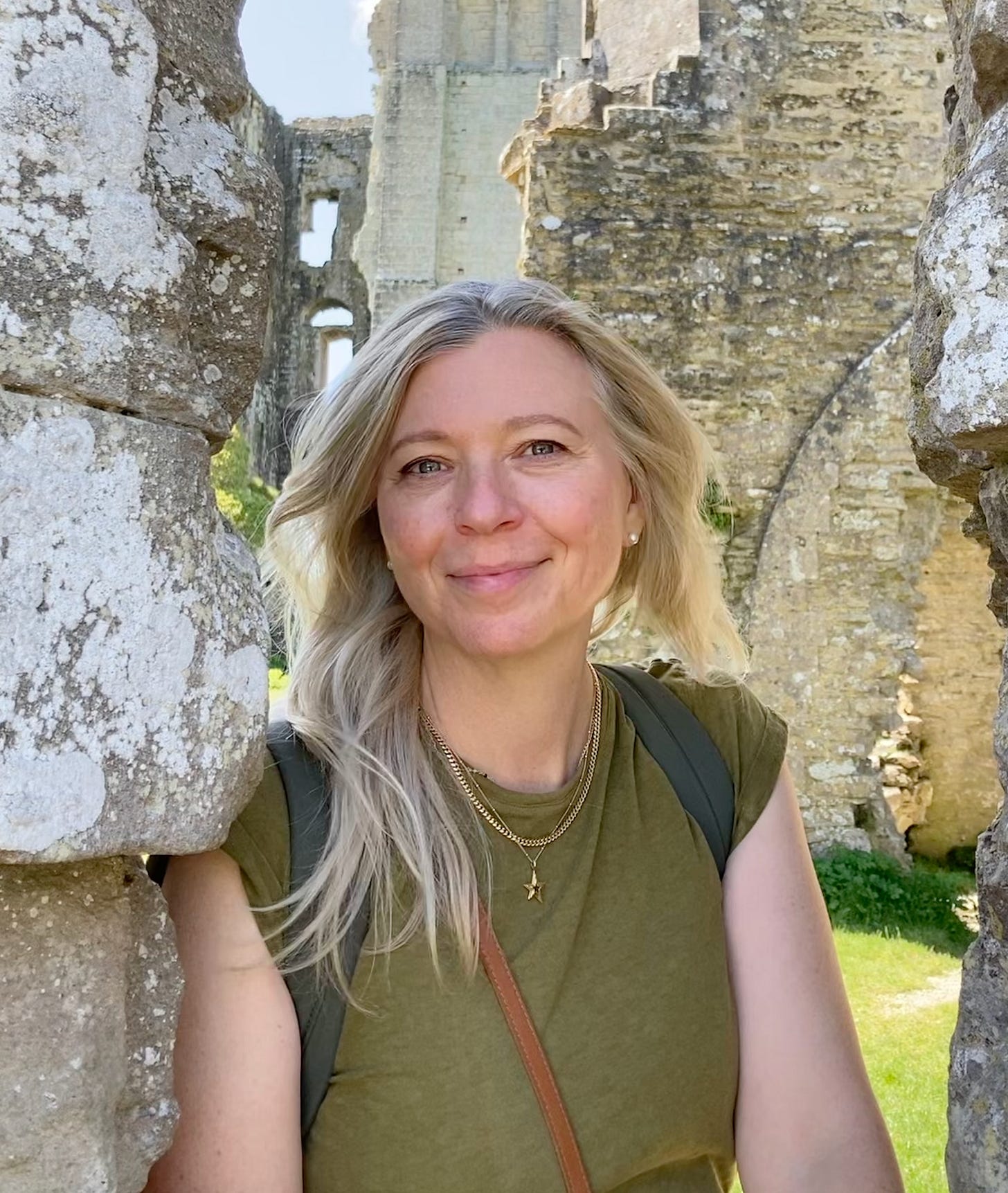Off the Page: Featuring Maggie Langrick
"Our wounded parts want to be witnessed; seen and heard. Writing, for me, is a powerful way to bear witness to my own experience, which brings relief, comfort, and resolution."
For over two decades, I have supported writers as an editor, publicist, and mindfulness-based book coach, at various publishing houses, universities, corporations, and organizations. Through this journey, I’ve discovered that the quality of a writing life extends far beyond merely putting words on a page. It encompasses all the activities we engage in when we’re not writing. This insight inspired me to create Off the Page: Conversations About Writing as a Practice, where I feature writers sharing their diverse routines—from yoga and meditation to walking, reading, and even Olympic weightlifting. There’s no one-size-fits-all approach to writing, and there are as many ways to forge a writing life as there are humans on the planet.
This week, I’m thrilled to introduce my dear friend Maggie Langrick—a cherished member of the Narrative Healing community and a visionary publisher and writer.
Bio: Maggie Langrick is a Los Angeles-based writer whose work has appeared in Elephant Journal, Human Shift magazine, and her Substack, The Underwire. She hosts the Selfish Gift podcast, a series of intimate conversations with writers, creators, and the professionals who assist them. Maggie is also the founding publisher of Wonderwell Press, an imprint of Greenleaf Book Group which publishes nonfiction books that help, heal, and inspire. She is a graduate of Martha Beck's Wayfinder Life Coach Training program and focuses her creativity coaching practice on supporting writers and creatives to identify their creative vein of gold and make smart publishing decisions. Visit: https://maggielangrick.com/
Lisa Weinert (LW): How is writing a healing practice?
Maggie Langrick (ML) We are all subject to an internal voice that chatters at us incessantly, and when there is trauma in our past that voice can take on a very judgmental or alarmist tone. For me at least, this voice is terribly repetitive, drawing me into perpetual loops of internal arguments that remain unresolved over time. My take on this is that my subconscious is trying mightily to make sense of my experiences so that they can be laid to rest. Writing is the best way I know how to untangle my fragmented, repetitive thoughts and construct an empowering new narrative that allows me to release the past and move forward with a more enlightened perspective and a lighter heart.
LW: How is writing healing?
ML: Our wounded parts want to be witnessed; seen and heard. Writing, for me, is a powerful way to bear witness to my own experience, which brings relief, comfort, and resolution.
LW: What is the difference between “traditional writing” and “writing with a healing intention?:
ML: Writing can, of course, take many focuses, from business/marketing writing to the sharing of all sorts of practical knowledge. Writing with a healing intention is different both in terms of its product—in my case, usually focusing on the topic of pain, healing, and growth—and in its process. The “traditional writing” process may center on pragmatic elements such as setting the stage for a productive session, organizing your material, and keeping oneself on task. Writing with a healing intention is more intuitive and incorporates time and space for personal reflection and emotional processing.
Aside from these, there is fiction writing, which seeks to entertain. I suspect there is also healing potential in writing fiction, but that form is somewhat outside of my purview as an essayist and writer of nonfiction so I don’t have as much insight into it.
LW: What role does movement play in your writing life? Do you return to any somatic practices, mindfulness exercises, or other rituals before or after you write?
ML All the personal development work I have done with therapists, coaches, and self-help books is invaluable to me as a writer as well as a human. I use journaling and mindfulness to support myself emotionally and psychologically while writing, and incorporate many specific self-help techniques into my creative practice. As for movement, walking is such as integral part of my writing process, I consider it to be central to the work! Whenever I am stuck, unsure what I want to say or how I want to say it, moving my legs moves my thinking forward too, every time.
LW: What role does meditation play in your creative life?
ML: I don’t have a regimented meditation practice these days, but I turn to meditation whenever I feel myself on shaky emotional ground with my work, or when my inner critic gets loud. Meditation takes me out of fight/flight/freeze and enables me to take the perspective of the compassionate witness to my life experience, which includes my writing experience. Connecting to my higher consciousness through meditation is as important to me as connecting to my body and my humanity through movement. Together these practices are not just supportive; they are the lifeblood of my creative life.
LW: Where do you find inspiration?
ML: My writing is very much guided by intuition; I stay alert to my experience and listen for the signal to write. Fragmented memories, present-day conversations, reflections on global events and universal experiences can all spark a new piece of writing, or provide a new angle on an ongoing project.
LW: How has sharing your work changed your life?
For me, this is about the willingness to be seen, not only as a writer but as a human being. Since I started sharing my work publicly a few years ago, I feel more rooted in my place in this human family. More free to be myself in all ways. More in touch with my truth. These qualities are what make life worth living.
LW: What writers have influenced you the most?
These days I am immersing myself in the work of essayists and memoirists such as Melissa Febos, Ross Gay, Katherine May, Leslie Jamison, and so many others. I love Anne Lamott for how skilfully she explores grand, profound themes through a playful (even goofy?), down-to-earth voice. My all-time favorite author is Martha Beck, although her style is very different from mine. I love her for her courage, wisdom, intellect, and folksy humor. Her teaching has changed my life.
LW: What book are you excited to read next?
I’m currently reading Maggie Smith’s memoir, You Could Make This Place Beautiful, and it’s blowing me away with its poetic, bite-sized vignettes. I’m also dipping more into fiction these days to see what storytelling techniques I can pick up and apply to memoir-writing. I just finished Swan Huntley’s book I Want You More, which I absolutely devoured. She is so great at letting readers inside her characters’ heads and explores very deep and intimate truths through breezy, economical storytelling. I’m also reading Signal Fires by Dani Shapiro.
LW: Is there anything else you’d like us to know?
As a graduate of Martha Beck’s Wayfinder life coach training, I am interested in how her methodology and techniques for life design can be applied to a creative practice. These days I blend this life-coaching skill set with publishing/editorial consultation in my creativity coaching services, helping clients to work through the emotional or cognitive blocks in their writing practice. This interdisciplinary approach to coaching has really deepened my understanding of the creative process. It’s so exciting.






